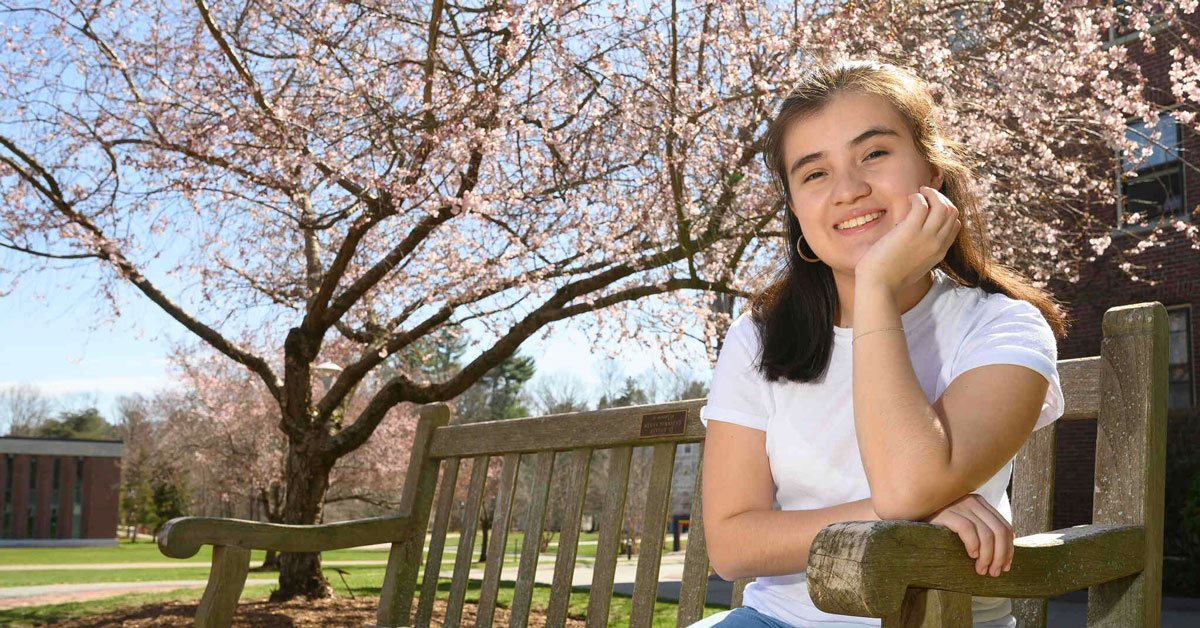Bessie Reina Figueroa ’26 wins Projects for Peace grant

Neuroscience major will raise mental health awareness in El Salvador
Bessie Reina Figueroa ’26 knows firsthand just how difficult it can be to find adequate mental health resources in her homeland of El Salvador.
There’s the overburdened guidance counselor, single-handedly tasked with helping hundreds of students.
There’s the waiting process, sometimes weeks, to find a therapist.
And then there’s the stigma surrounding mental health that exists not only in her country, but throughout Latin America, as well as in many other countries.
“El Salvador for generations has been closed to talking about emotions, needless to say about psychological disorders,” Figueroa said. “I have friends back home where their families don’t take mental health seriously. They don’t get help and they keep struggling.”
This taboo, according to Figueroa, means children, parents and teachers often don’t speak about mental health—and those who are battling illnesses struggle in silence.
“Mental health awareness is not just about talking about the issue, but also learning about it before talking about it,” the sophomore neuroscience major said. “It’s not that people don’t care about it, but there’s a lack of knowledge. There’s a gap that needs to be addressed.”
In an attempt to address that gap, Figueroa applied for and won a Projects for Peace grant. Created in 2007 by Kathryn Wasserman Davis, the late mother of alumna Diana Davis Spencer ’60, the program funds 125 projects each summer for students who are “developing innovative, community-centered and scalable responses to the world’s most pressing issues.”
Wheaton students have earned one of the awards every year since the grant was created.
With the $10,000 grant, Figueroa—who also plans to minor in psychology—hopes to promote mental health literacy and destigmatize the topic in El Salvador through her project ApapachArte.
With the help of three mental health professionals, she will create workshops in several cities for high school and college students. There will be art therapy sessions, as well as more general workshops that will inform students about the resources available to them.
“There are students who don’t know what they’re experiencing, whether it’s anxiety or panic disorders,” she said. “By identifying it first and educating themselves more on the topic, they will be able to open up and speak about it with their peers, professors, family members and school counselors.”
Figueroa said Wheaton’s tightly-knit community and readily available mental health resources at the Counseling Center also inspired her to apply for the grant.
“I see a lot of projects from the Counseling Center that I’ve participated in,” she said. “I feel this active exposure to mental health information and resources on campus. All of that has not only helped with my wellbeing, but I also see the impact on other students. They can be accountable and their experiences are validated.”
Figueroa also said the openness she feels on campus, and the encouragement Wheaton gives students to seek help, was something she wanted to replicate abroad.
She said joining Wheaton’s Intergroup Dialogue—a weekly meeting where students talk about different social issues—allowed her to feel confident in speaking up. She eventually became a dialogue facilitator in the program run by the Marshall Center for Intercultural Learning.
“It showed me that I can make an impact on an audience,” she said. “It inspired me to go beyond a small group and to make an impact in my community on an international level.”
—By Scott Enman ’15
